| Malcolm Cooke |
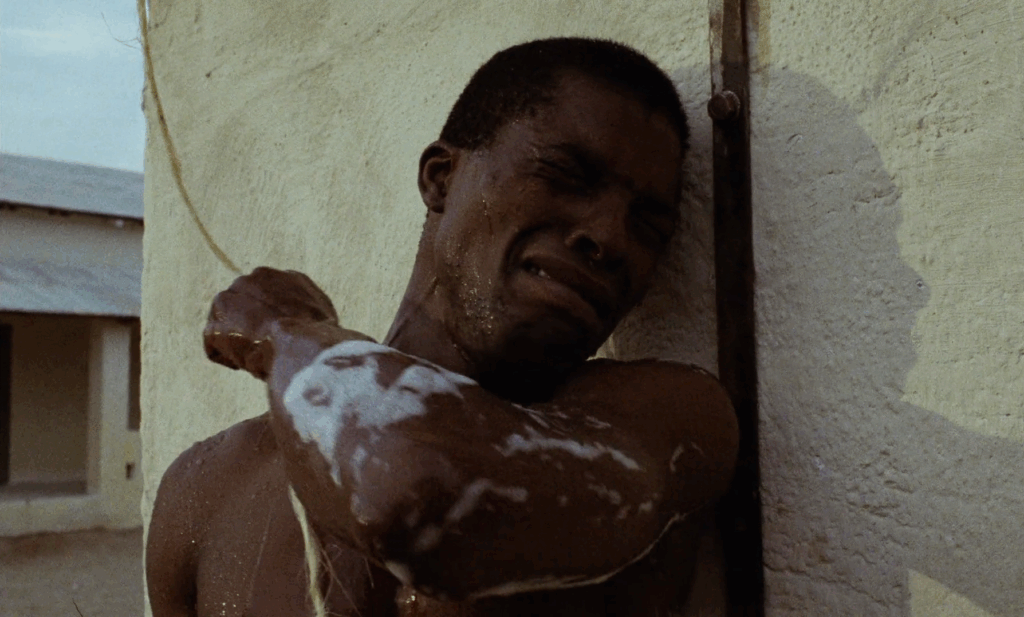
Chocolat plays at the Trylon Cinema from Sunday, April 27th, through Tuesday, April 29th. For tickets, showtimes, and other series information, visit trylon.org.
Claire Denis moved to Cameroon, the setting of Chocolat, when she was only two months old.1 With a colonial administrator father, she had an itinerant childhood driven by her father’s passion for geography,2 growing up across Burkina Faso, Somalia, and Senegal in addition to Cameroon.3 The films story, then, of a young girl growing up in Cameroon with a colonial administrator father, sounds very familiar.
But Claire Denis is “adamant” the film is not autobiographical.4
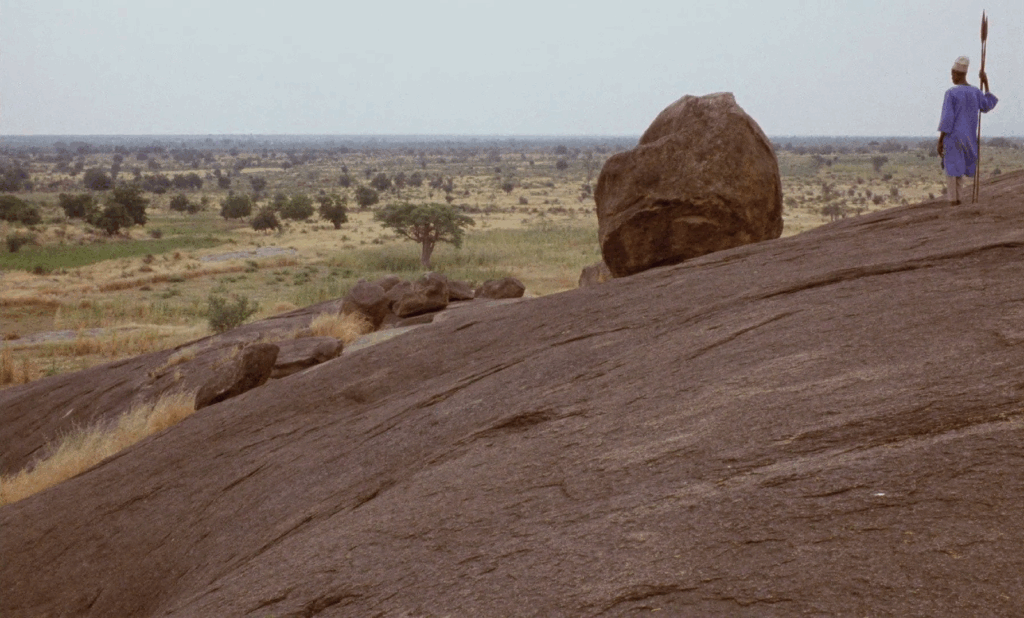
Instead, she refers to it as a “work of ‘the collective memory.’” Denis has said she made the film as “a very naive way a statement about something I experienced as a child“5, and that she thinks “I had a desire to express a certain guilt I felt as a child raised in a colonial world.” This certainly sounds like an autobiographical film, but rather than a memoir of something that happened in her childhood, Denis sees it as the expression of a common experience among those who grew up within a specific colonial social structure and the “perverted relationships” it created.
Chocolat was made when Denis was already 41. Having had made what she calls the “totally suicidal” decision to study economics before attending and graduating from the prestigious French film school IDHEC in 1969, she went on to work as an assistant director for towering figures in cinema such as Jacques Rivette and Wim Wenders, as well as befriending artists and filmmakers like John Lurie and Jim Jarmusch during her time in the United States. In 1988 it was finally time for her first feature.
Her work with revered filmmakers transferred to a clearly confident first picture. The composition of nearly every shot is meticulous. Her penchant for slow pans allows the audience to soak in the gorgeous Cameroonian landscapes and settle into daily tableaus of life she constructs. The opaque and laconic style is established early, something she has said she admires in Jarmusch and Wenders, as well as Dashiell Hammet: “I like laconic stories because they can raise strong emotions in a different way… What [Hammet] does is to give you your choice of standing where you want. He lets you decide for yourself as to how you feel about his people.”
The film itself begins with one of these plodding slow pans, introducing a woman named France (signaling right out of the gate that the film wears its symbolism proudly and unsubtly on its sleeve) sitting on a beach in Cameroon, where she spent her childhood in a white family deeply involved in the country’s colonial infrastructure. After meeting and getting a ride from a charitable local man and his young son, the filmmaking seamlessly transports us through France’s roadside gaze of the passing gorgeous Cameroonian landscape to a similar view decades earlier, as she rides on a truck next to her family’s personal servant, Protée (Isaach de Bankolé). Right away the narrative is established as a memory from long ago, viewing the world of colonialism through the eyes of a child.
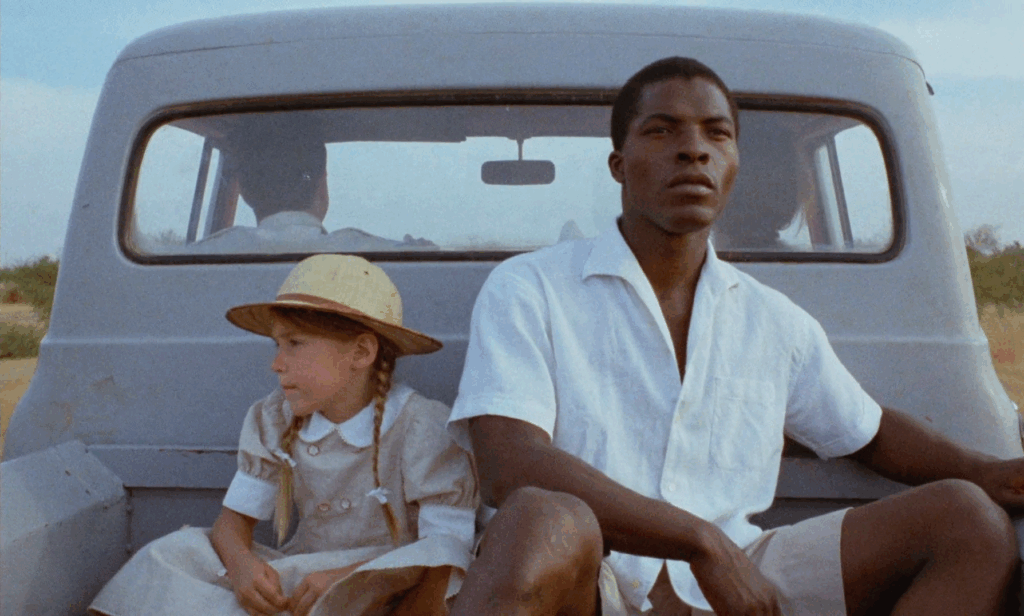
France’s relationship with Protée is a core element of the film and another area of almost autobiography for Denis. She states that “My parents would certainly not have had someone serve them meals. I wasn’t raised like that.” But the relationship between Protée and France still pulls deeply from her own experience. They have a kind of friendship that manages to side step certain barriers that are erected by the hierarchy of colonial society. They are friendly and playful where others are cold and distant. Elsewhere France’s mother Aimée (Giulia Boschi) berates their cook for being unable to make French cuisine, having been only trained by British colonials to make options such as Yorkshire Pudding or Porridge. Meanwhile France is happy to dig in the dirt and eat bugs that Protée offers her.
“I remember as a child in Africa that, of course, I could have contact with people that my parents couldn’t.” Denis says. Remembering a type of person who would work for French families as “being a man who is not called a man, but a boy—the only normal relationship [they can have] is with the children.” (4) Although the freedom found in this relationship allows for some humanity and connection, Denis still calls such a relationship a “perverted” one, one of many in a social context where people are often forced to smother their own emotions to maintain a perverse and dehumanizing hierarchy.
Protée is brimming with confidence, competence, and sensitivity, and has a blossoming flirtation with France’s mother Aimée, yet he is still habitually degraded and made invisible in small ways. While the colonial administrator and father of the family, Marc Dalens (François Cluzet), is away on a colonial survey, a British administrator of status comes to visit. Aimée is forced to put on high society airs and present an elegant dinner party, carving out an absurd portrait of European society thousands of miles removed from Paris. As she has Protée help ready her dress, the sensual connection that has been slowly building between the two reaches a fever pitch. But instead of the volcanic undercurrents erupting into a human expression of passion, Aimée denies the connection, instead heading to face Boothby’s much more hollow drunken flirtations, while Protée is made to stand at the ready against the wall in formal dress alongside the other servants, invisible and unmoving like any other fixture of the mansion. Countless shots throughout the film place Protée on the periphery, cut off parts of his body, or leave him as a figure in the background. Protée and Aimée’s human connection is never allowed to further blossom, as Aimée is unable to face her feelings and later coldly asks her husband to banish Protée from working in the house.
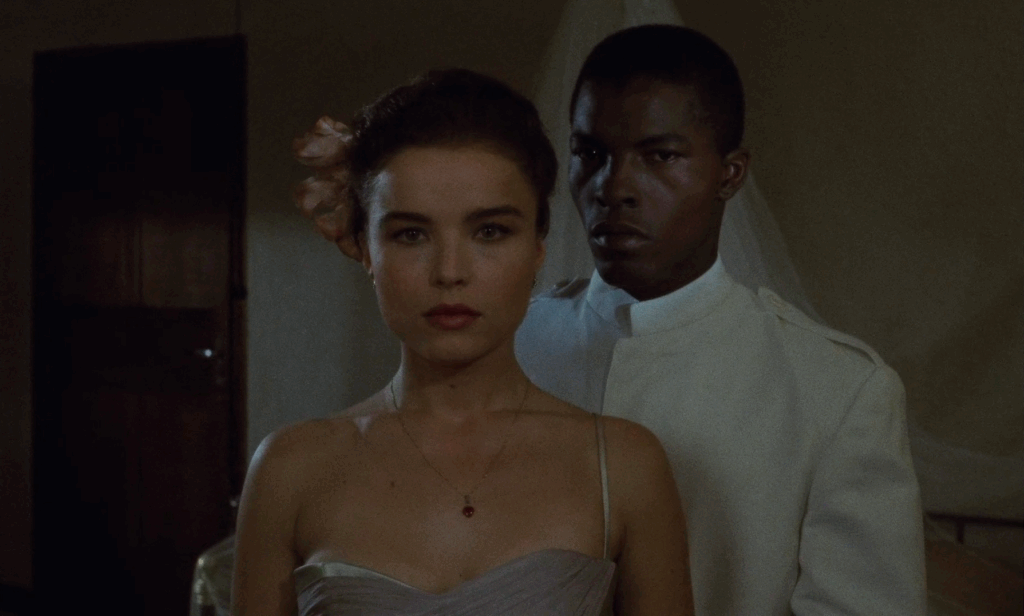
Eventually Marc Dalens returns, followed by the arrival of a parade of white French colonial figures who each have their own unique articulation of racism and the perverted relationships of colonialism. Of these perhaps the most significant is Luc Segalen (Jean-Claude Adelin), who turns this formula on its head. A white Frenchman on a walkabout through Africa, he is directly disdainful of colonialism and radical in his transgressions of the invisible barriers of hierarchy between Africans and Europeans. He does hard labor alongside other Africans, refuses to sleep in the colonial manor (which Marc explains his “his place”), and reads a provocative account by a 19th Century French explorer who, after spending months amongst black Africans, is shocked by white skin which he says “evokes something similar to death.” Laying the logical absurdities of white supremacy bare by placing them on their head, he reads: “Can one blame the natives for considering the white man as something contrary to nature, as a supernatural or fiendish creature?”
Luc’s presence is maybe the most didactic part of the film, directly expressing to the audience the anti-colonial messages at its core, but more than that he serves as an engine to drive the story forward. Luc’s ire eventually turns towards even Protée, attempting to reveal and critique Protée’s own self-effacing internalization of colonial social structures. As Luc walks into the darkness of the night in an arresting shot, leaving behind both literally and metaphorically the unjust colonial spaces of the film, he prompts Protée to consider his own possibility of escape. As Protée further considers his own place in the family, the perversions of even the seemingly wholesome relationship with France come to a head in the film’s climax.
But the most concise expression of the film’s theme comes from Marc as he explains to his sleeping daughter what the meaning of the horizon line is near the end of the film. The horizon, he says, is an invisible line far in the distance, which gets farther from you the closer you get. You can never cross it, but it also isn’t real. Such are the divisions between humans created by colonialism.
But one can easily ask if these lessons are hollow when coming from a leader in the very colonial structure which creates such alienation. Denis’s own colonial bureaucrat father supported independence of African states, and her family even stayed in Cameroon several years after its independence in 1960 as her father helped the new government set up a radio station. But even if a critique of colonialism comes from a sympathetic white perspective, it still comes from a white perspective. Denis herself is aware of this, saying: “I tried to be honest in admitting that Chocolat is essentially a white view of the ‘other.’”6
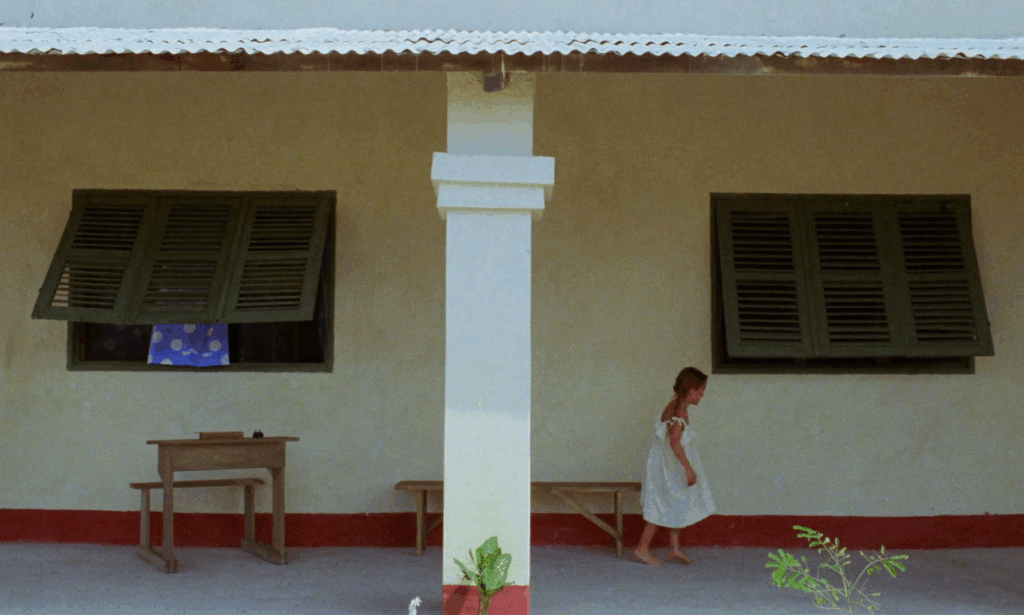
This is not to denigrate the film or the effectiveness of its message. In fact, quite the contrary, Denis’s films are strong because of their specificity of perspective. She has returned to the theme of the hopelessness and dehumanization of colonialism from the perspective of the colonizer on multiple occasions to strong effect. In White Material she tells the story of a French coffee plantation owner trying to save her property in the midst of a civil war in an unnamed African country, and earlier and more abstractly her massively acclaimed Beau Travail examines pointless hate and self destruction within the French Foreign Legion.
It may be important to recognize the limitations of criticizing colonialism from the viewpoint of the colonizers, but like any great artist Denis’s effectiveness comes from having a unique and personal view of the world which she can express with clarity and artfulness. Even if Chocolat is not literally autobiographical, it is still a deeply personal expression of Denis’s own perspective and experiences. And that’s where its power lies.
References
1 Kevin Thomas, “Denis Offers a Taste of Her Own Past with ‘Chocolat.’” Los Angeles Times, April 20, 1989, https://www.latimes.com/archives/la-xpm-1989-04-20-ca-2369-story.html
2 Aimé Ancian, “Claire Denis: An Interview”, translated by Inge Pruks, Senses of Cinema, No. 23 (November-December 2002), https://web.archive.org/web/20071012120838/http://www.sensesofcinema.com/contents/02/23/denis_interview.html
3 Herminoe Eyre, “Claire Denis on filmmaking and feminism” Prospect, Issue 172m June 21, 2010, https://www.prospectmagazine.co.uk/culture/54214/claire-denis-on-filmmaking-and-feminism
4 Alice Gregory, “The Fearless Cinema of Claire Denis.” The New Yorker, May 21, 2018, https://www.newyorker.com/magazine/2018/05/28/the-fearless-cinema-of-claire-denis
5 Jonathan Romney, “Claire Denis interviewed by Jonathan Romney.” The Guardian, June 28, 2000, https://www.theguardian.com/film/interview/interviewpages/0,6737,338784,00.html
6 Brian Meacham, “Film Notes: Chocolat.” Yale Film Archive, December 8, 2019, https://web.library.yale.edu/film/notes/fn00081
Edited by Olga Tchepikova-Treon
